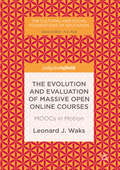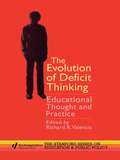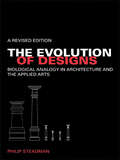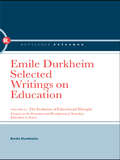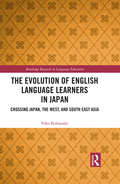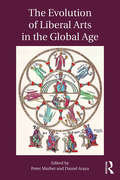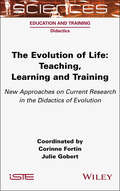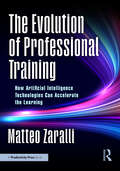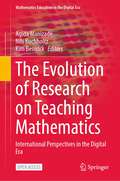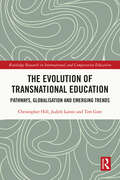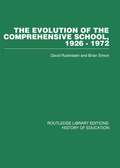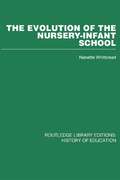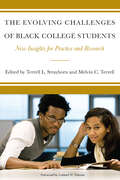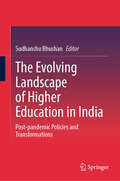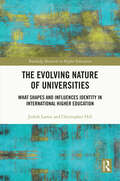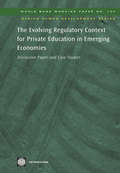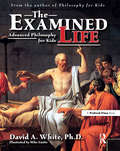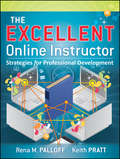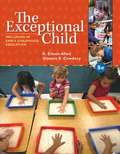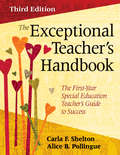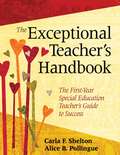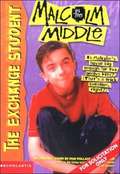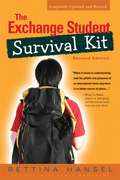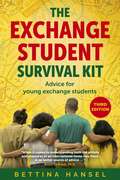- Table View
- List View
The Evolution and Evaluation of Massive Open Online Courses
by Leonard J. WaksThis book offers a re-assessment of the educational and occupational value of MOOCs based on developments since 2013. When MOOCs appeared--amidst great fanfare--in 2012, leaders proclaimed an educational "revolution. " By 2013, however, dramatic failures, negative research findings, and sharp critiques ended the MOOC hype. This book examines both MOOCs and prior distance learning innovations, and offers a broad overview of their educational, economic and social effects. Chapters explore ties between MOOCs and emerging pedagogical models as well as exponentially rising tuition rates, student debt, and chronic underemployment of university graduates worldwide. It offers readers a comprehensive, up-to-the-moment guide to the MOOC phenomenon.
The Evolution of Deficit Thinking: Educational Thought and Practice (Stanford Series On Education And Public Policy Ser. #Vol. 19)
by Richard R. ValenciaDeficit thinking refers to the notion that students, particularly low income minority students, fail in school because they and their families experience deficiencies that obstruct the leaning process (e.g. limited intelligence, lack of motivation, inadequate home socialization). Tracing the evolution of deficit thinking, the authors debunk the pseudo-science and offer more plausible explanations of why students fail.
The Evolution of Designs: Biological Analogy in Architecture and the Applied Arts
by Philip SteadmanThis book tells the history of the many analogies that have been made between the evolution of organisms and the human production of artefacts, especially buildings. It examines the effects of these analogies on architectural and design theory and considers how recent biological thinking has relevance for design. Architects and designers have looked to biology for inspiration since the early 19th century. They have sought not just to imitate the forms of plants and animals, but to find methods in design analogous to the processes of growth and evolution in nature. This new revised edition of this classic work adds an extended Afterword covering recent developments such as the introduction of computer methods in design in the 1980s and ‘90s, which have made possible a new kind of ‘biomorphic’ architecture through ‘genetic algorithms’ and other programming techniques.
The Evolution of Educational Thought: Lectures on the formation and development of secondary education in France (The\yale Cultural Sociology Ser.)
by Emile DurkheimFirst Published in 2005. Routledge is an imprint of Taylor & Francis, an informa company.
The Evolution of English Language Learners in Japan: Crossing Japan, the West, and South East Asia (Routledge Research in Language Education)
by Yoko KobayashiThis book seeks a better understanding of the sociocultural and ideological factors that influence English study in Japan and study-abroad contexts such as university-bound high schools, female-dominant English classes at college, ESL schools in Canada, and private or university-affiliated ESL programs in Singapore and Malaysia. The discussion is based not only on data garnered from Japanese EFL learners and Japanese/overseas educators but also on official English language policies and commercial magazine discourses about English study for Japanese people. The book addresses seemingly incompatible themes that are either entrenched in or beyond Japan’s EFL context such as: Japan’s decades-long poorly-performing English education vs. its equally long-lived status as an economic power; Japanese English learners’ preference for native English speakers/norms in at-home Japanese EFL contexts vs. their friendship with other Asian students in western study-abroad contexts; Japanese female students’ dream of using English to further their careers vs. Japanese working women’s English study for self-enrichment; Japanese society’s obsession with globalization through English study vs. the Japanese economy sustained by monolingual Japanese businessmen; Japanese business magazines’ frequent cover issues on global business English study vs. Japanese working women’s magazines’ less frequent and markedly feminized discourses about English study.
The Evolution of Liberal Arts in the Global Age
by Peter Marber Daniel ArayaAdvanced and developing countries across the globe are embracing the liberal arts approach in higher education to foster more innovative human capital to compete in the global economy. Even as interest in the tradition expands outside the United States, can the democratic philosophy underlying the liberal arts tradition be sustained? Can developing countries operating under heavy authoritarian systems cultivate schools predicated on open discussion and debate? Can entrenched specialist systems in Europe and Asia successfully adopt the multidisciplinary liberal arts model? These are some of the questions put to leading scholars and senior higher education practitioners within this edited collection. Beginning with historical context, international contributors explore the contours of liberal arts education amid public calls for change in the United States, the growing global interest in the approach outside the United States, as well as the potential of liberal arts philosophy in a global knowledge economy.
The Evolution of Life: Teaching, Learning and Training - New Approaches on Current Research in the Didactics of Evolution
by Corinne Fortin Julie GobertThe aim of this collective work is to give an account of the topicality and dynamics of new research in the didactics of evolution, by articulating francophone and international work. The various contributions pursue a reflection on the challenges of teaching and learning about evolution, based on historical, epistemological and societal approaches. The themes addressed illustrate the vitality and diversity of research issues in educational sciences, from primary school to university. Structured around different theoretical fields (problematization, didactics of the curriculum, nature of science, etc.), this book explores the content, teaching and learning processes and approaches, teaching practices, as well as pre-service and in-service teacher training, with a view to both intelligibility and feasibility.
The Evolution of Professional Training: How Artificial Intelligence Technologies Can Accelerate the Learning
by Matteo ZaralliStructured into three distinct parts, this book is an indispensable resource for navigating the evolution of education and professional training in the age of artificial intelligence (AI) and virtual reality.The book’s Introduction speaks to the current context, a period marked by crisis and a digital industrial revolution, emphasizing how the advent of cutting-edge technologies such as artificial intelligence is fundamentally altering work and social dynamics. It then examines AI, exploring its distinctive features compared to human intelligence and introducing the concept of spatial computing. It illustrates how these technological advancements are expanding the possibilities for human-machine interaction.In the first part, the focus shifts to artificial intelligence, the importance of data in training intelligent systems, and the emerging concept of the augmented worker. This section explores how AI can enhance human capabilities, facilitate more efficient and personalized learning or training, and promote unprecedented professional development.The second part ventures into philosophical reflections and ethical considerations regarding the future of work and AI’s impact on daily reality. It discusses the changing work paradigm, the challenges posed by increasing digitalization, how AI contributes to an altered perception of truth, and the implications of the multiple digital identities that people can assume in virtual spaces. A task and reflection that businessmen, executives, and managers need to consider.Finally, the third part emphasizes the critical importance of training, examining how virtual reality and artificial intelligence technologies can accelerate the learning and mastery of hard and soft skills. This section delves into the different sectors that have been or will be transformed by these technologies’ integration, offering perspectives on how best to prepare for the challenges and opportunities of the future.This book is not just an analysis of the impact of emerging technologies on learning and professional development; it is also an invitation to reflect on the future of work, the nature of intelligence, and the evolution of human society in the digital age. Balancing technical insights with philosophical considerations, it targets a broad audience, from educators to professionals, policymakers to the curious, providing tools to understand and navigate the rapid transformations of our time.
The Evolution of Research on Teaching Mathematics: International Perspectives in the Digital Era (Mathematics Education in the Digital Era #22)
by Nils Buchholtz Kim Beswick Agida ManizadeThis open access book investigates current issues related to the evolution of research on teaching mathematics and examines up to thirty years of presage-process-product research (PPPR) in mathematics with respect to conceptualization, instrumentation, and design. The book discusses the theoretical and methodological challenges associated with PPPR, critically reviews current research, and explores the likely direction of further developments to identify future paths for research on high-quality mathematics teaching in the digital era. Subjects that are covered in this work focus on the relationships between 1) student learning outcomes measured upon completion of the mathematics teaching; 2) student learning activities in the classroom; 3) interactive mathematics teacher activities, and best practices in mathematics classrooms conducted in the presence of students; 4) pre-post-active mathematics teacher activities such as planning, assessment, and other teaching-related activities outside of the classroom; 5) mathematics teachers’ competencies, knowledge, and skills; and 6) mathematics teachers’ characteristics, including beliefs, attitudes, and motivation. This book discusses the evolution of such research in mathematics teaching and teacher education in the digital era and is of interest to researchers exploring the field of mathematics teaching and mathematics teacher education as well as educators.
The Evolution of Transnational Education: Pathways, Globalisation and Emerging Trends (Routledge Research in International and Comparative Education)
by Christopher Hill Judith Lamie Tim GoreThis book examines issues of identity; positionality; community; value and relevance, to explore where transnational higher education is headed and what form it may take moving forwards. Transnational higher education has traditionally been viewed through the lens of access. Now, the authors argue, higher education must think more closely about impact and legacy as changing patterns of student recruitment, reduced options for mobility and the need to establish value for money will be at the heart of the next stage of evolution. Drawing on international case studies from Europe, the Middle East and Central Asia, the book outlines the past, present and future of higher education working across national boundaries, and the extent to which this represents the globalisation of the university sector. The book opens with an analysis of the role of the university in both local and global contexts, moving on to explore policy and collaboration and then looking at emerging trends and activity in international higher education. The final section draws directly from students, to give their perspective and understanding of the core themes throughout the book. This volume will have a wide readership amongst higher education scholars, undergraduate and postgraduate students and policy makers.
The Evolution of the Comprehensive School: 1926-1972
by David Rubinstein Brian SimonOriginally published 1969. This reprints the second edition of 1973, with updated reading list and bibliography.This volume sets the movement towards comprehensive education against its historical background and discuss the main reasons for the decision to establish a national comprehensive system.
The Evolution of the Nursery-Infant School: A History of Infant Education in Britiain, 1800-1970
by Nanette WhitbreadOriginally published in 1972.This book considers the actual development of infant schools and education in Britain against the background of industrialization and social change, making clear how this development was influenced by the ideas of particular theorists from both the Continent and England.
The Evolving Challenges of Black College Students: New Insights for Policy, Practice, and Research
by Terrell L. Strayhorn Lemuel W. Watson Melvin C. TerrellPresenting new empirical evidence and employing fresh theoretical perspectives, this book sheds new light on the challenges that Black Students face from the time they apply to college through their lives on campus.The contributors make the case that the new generation of Black students differ in attitudes and backgrounds from earlier generations, and demonstrate the importance of understanding the diversity of Black identity.Successive chapters address the nature and importance of Black spirituality for reducing isolation and race-related stress, and as a source of meaning making; students’ college selection and decision process and the expectations it fosters; first-generation Black women’s motivations for attending college; the social-psychological determinants of academic achievement, and how resiliency can be developed and nurtured; institutional climate and the role of cultural centers; as well as identity development; and mentoring. The book includes a new research study of African American male undergraduates who identify as gay or bisexual; discusses the impact of student-to-student interactions in intellectual development and leadership building; describes the successful strategies used by historically Black institutions with at-risk men; considers the role of parents in Black male students’ lives, and the applicability of the “millennial” label to the new cohort of African American students.The book offers new insights and concrete recommendations for policies and practices to provide the social and academic support for African American students to persist and fully benefit from their collegiate experience. It will be of value to student affairs personnel and faculty; constitutes a textbook for courses on student populations and their development; and provides a springboard for future research.
The Evolving Landscape of Higher Education in India: Post-pandemic Policies and Transformations
by Sudhanshu BhushanThe edited volume discusses the long period of post-colonial developments in higher education in India. It examines the legitimacy of the policies pursued post-pandemic with a focus on the role of teachers and the students' voices. It addresses the essential question of how the technological ascendance in higher education addresses social justice. What is the role of teachers in a new landscape of higher education? It offers insights into the efficiency-centric proposition of the state-market-technology triad, the current paradigm of higher education worldwide. It presents evidence to understand how efficiency has a tradeoff with various aspects of social justice. The authors deal with questions, such as the challenges of privatization and how the commodification of higher education runs counter to the idea of inclusive higher education. The authors critically look at the online form of higher education and how it has led to the shrinkage of democratic spaces in higher education. It discusses the transformative role of teachers with increasing managerialism of higher education. The book highlights a deep understanding of the increasing role of the market and technology and their influence in negating an inclusive and democratic public space in higher education. It appeals to teachers and students by enabling them to understand the market's and technology's impacts on higher education. It has the potential to be a reference book in colleges and universities. It will help the large community of practitioners and policymakers guard against the dangers of overt marketization. The book benefits policymakers, university administrators and teachers, and researchers of higher education interested in governance, technology, teaching, and research in higher education.
The Evolving Nature of Universities: What Shapes and Influences Identity in International Higher Education (Routledge Research in Higher Education)
by Christopher Hill Judith LamieUsing analysis and review of international case studies and emerging models, Lamie and Hill’s edited book explores the very nature of a university and discusses growth, sustainability, and risk as universities navigate their role, value and purpose. As universities continue to emerge from the pandemic, there is new room to critically reflect on the role of higher education, both locally and abroad, and how it impacts a sense of place, identity, and engagement within their communities. The authors contribute their unique perspectives to explore these themes and advise on how a university can best benefit the well-being and development of its students, staff and the local community. To what extent are universities shaped by their environment? How does this provide them a fixed sense of identity or a launching pad to expand beyond their immediate location? Such questions are examined along with the constraints and opportunities open to HEIs as they navigate the waters of international higher education and their impact on communities around the world. This deeply reflective text will appeal to researchers and students in higher education, as well as policymakers interested in the future of international higher education.
The Evolving Nature of Universities: What Shapes and Influences Identity in International Higher Education (Routledge Research in Higher Education)
by Christopher Hill Judith LamieUsing analysis and review of international case studies and emerging models, Lamie and Hill’s edited book explores the very nature of a university and discusses growth, sustainability, and risk as universities navigate their role, value and purpose. As universities continue to emerge from the pandemic, there is new room to critically reflect on the role of higher education, both locally and abroad, and how it impacts a sense of place, identity, and engagement within their communities. The authors contribute their unique perspectives to explore these themes and advise on how a university can best benefit the well-being and development of its students, staff and the local community. To what extent are universities shaped by their environment? How does this provide them a fixed sense of identity or a launching pad to expand beyond their immediate location? Such questions are examined along with the constraints and opportunities open to HEIs as they navigate the waters of international higher education and their impact on communities around the world.This deeply reflective text will appeal to researchers and students in higher education, as well as policymakers interested in the future of international higher education.
The Evolving Regulatory Context for Private Education in Emerging Economies
by Harry Anthony Patrinos Svava Bjarnason Jee-Peng TanGovernments around the world, and particularly those in developing countries, face significant educational challenges. Despite progress in raising education enrollments at the basic education level, much remains to be done. Today, about 77 million children in developing countries are not in school, particularly in Sub-Saharan Africa and South Asia. Higher education participation rates remain low in many developing countries, and public higher education institutions (HEIs) struggle to absorb growing numbers of secondary school graduates. Public universities face ongoing challenges, including a lack of teaching and research resources, and the loss of qualified staff to developed countries. The inability of public sector educational institutions, particularly in developing countries, to absorb growing numbers of students at all levels of education has seen the emergence of private schools and HEIs. This paper briefly examines the international experience concerning the regulation of private education at the school and higher education level. It begins with an overview of the private school and higher education sectors and a short discussion of the potential benefits of increased private participation in education. The remainder of the paper focuses on the following questions and sets out propositions for governments to consider.
The Examined Life: Advanced Philosophy for Kids (Grades 7-12)
by David A. WhiteIn this book, the follow-up to the best-sellingPhilosophy for Kids, Dr. David White delves deeper into the philosophical questions kids (and adults) care about deeply. Through vibrant discussions and debate, the book offers ways teachers can help students grapple with age-old questions about the nature of friendship (Aristotle), time (Augustine), knowledge (Plato), existence of God (Aquinas), perception (Berkeley), freedom and society (Rousseau), and many more.The book is divided into three sections. Part 1 presents primary source readings that will encourage discussion and debate; Part 2 offers easy-to-use activities that focus on the direct application of philosophy to areas such as critical thinking, language, and the arts; and Part 3 offers a unique perspective just for teachers—a philosophical look at how teachers can become more reflective philosophers themselves. This is an excellent teachers' handbook for using advanced philosophy in the classroom.Grades 7-12
The Excellent Online Instructor
by Keith Pratt Rena M. PalloffThe hiring, training, and evaluation of good online instructors are high priorities for online institutions, and increasingly, all colleges and universities. This book shows what it takes to develop a new instructor in order to promote excellent online teaching, describes the qualities of a good online instructor, and reveals how to evaluate online teaching. In addition, it includes illustrative models of faculty training for online teaching based on adult learning principles and best practices in faculty training and identifies how technology can be used to facilitate and enhance the training process. The Excellent Online Instructor is perfect for faculty developers, instructional designers, program directors, and other administrators tasked with developing new instructors or training experienced faculty for the online environment.
The Exceptional Child: Inclusion In Early Childhood Education (Eighth Edition)
by Eileen K. Allen Glynnis Edwards CowderyFilled with classic and current research about all aspects of educating young children with special needs, THE EXCEPTIONAL CHILD: INCLUSION IN EARLY CHILDHOOD EDUCATION, 8th Edition, discusses key approaches and tools needed to provide an optimal setting for young exceptional children with special needs and their families. Many checklists and forms are included for use within the classroom to aid teachers and caregivers in developing a developmentally appropriate environment. The book's friendly and easy-to-use format is useful whether you are an educator or parent/caregiver.
The Exceptional Teacher's Handbook: The First-Year Special Education Teacher's Guide to Success
by Alice B. Pollingue Dr Carla F. SheltonSpecific guidelines and strategies to help special educators navigate their first year! This revised edition of a bestseller helps special educators move confidently from preplanning to post-planning for the school year. Teachers will find a step-by-step management approach complete with planning checklists and other ready-to-use forms. Featuring revisions based on IDEA 2004 and NCLB, this popular reference also provides updates on: Recognized disabilities Best instructional practices Successful parent conferences Effective plans for professional learning Alternate assessments, emergencies in the school setting, education terminology, and more
The Exceptional Teacher's Handbook: The First-Year Special Education Teacher?s Guide to Success
by Alice B. Pollingue Carla F. SheltonThe first year in the career of a special education teacher is filled with expectation and promise. Addressing the most common needs of beginning special education teachers, The Exceptional Teacher's Handbook helps new educators move confidently from preplanning to post-planning for the entire school year.The authors present a step-by-step management approach complete with planning checklists and other ready-to-use forms within the context of IDEA 2004 and NCLB. Written from the perspective of a classroom teacher, this popular reference offers updates on:* Recognized disabilities* Best instructional practices for getting the most out of your students* Successful parent conferences* Effective plans for professional learning* Alternate assessments, emergencies in the school setting, education terminology, and moreActively address challenges and concerns with this one-stop handbook that will help smooth the transition from student teacher to professional educator.
The Exchange Student (Malcolm in the Middle)
by Pam Pollack Meg BelvisoA story based on the hit TV series created by Linwood Boomer. Is Malcolm's house big enough to for two genius kids?
The Exchange Student Survival Kit
by Bettina HanselStudy abroad has never been so popular. Students are embarking on life-changing adventures, and they need some tried and true advice. The Exchange Student Survival Kit has become the essential guide for young people traveling abroad, helping them better understand the unique experience of international exchange programs. More important, it shows students how to avoid many common misunderstandings and problems that can occur in the course of their adjustment to a new culture, a new family, a new school and a new community. Based on her years of research and professional involvement with AFS Intercultural Programs, Dr. Hansel has filled the book with examples taken from the experiences of dozens of exchange students from a broad spectrum of cultures. This much-awaited new edition includesNew communications technology as it affects the experience: e-mail, instant messaging, cell phones, online games and blogs and information searches.Important advice on personal safety and pressing concerns for parents and students in light of war, terrorism and crime.Changes in society and family life that affect travelers: fast food replacing family meals, a new emphasis on religious beliefs, consumerism and globalism.For students going abroad, the Survival Kit is the first thing to pack!
The Exchange Student Survival Kit: Advice for your International Exchange Experience
by Bettina HanselStudy abroad has never been so popular. Students are embarking on life-changing adventures, and they need some tried and true advice. The Exchange Student Survival Kit has become the essential guide for young people traveling abroad, helping them better understand the unique experience of international exchange programs. More important, it shows students how to avoid many common misunderstandings and problems that can occur in the course of their adjustment to a new culture, a new family, a new school and a new community. Based on her years of research and professional involvement with AFS Intercultural Programs, Dr. Hansel has filled the book with examples taken from the experiences of dozens of exchange students from a broad spectrum of cultures. This much-awaited new edition includes New communications technology as it affects the experience: e-mail, instant messaging, cell phones, online games and blogs and information searches. Important advice on personal safety and pressing concerns for parents and students in light of war, terrorism and crime. Changes in society and family life that affect travelers: fast food replacing family meals, a new emphasis on religious beliefs, consumerism and globalism.For students going abroad, the Survival Kit is the first thing to pack!
